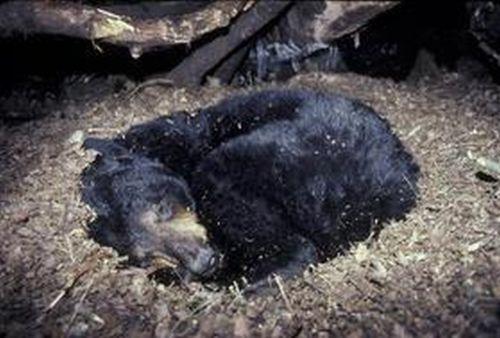And Other Techniques for Surviving Winter
- Tags:
- Wildlife,
- Something Wild

A light sleeper - this black bear in winter torpor to survive a season of scarce food resources.
(Photo courtesy of North American Bear Center)
Here at Something Wild, we’ve been thinking a lot about winter and the different strategies animals use to get through these cold, harsh months. There are quite a few techniques to survive winter if you don’t live in a toasty house with central heating or a roaring wood stove.
- The top 5 survival strategies are:
- Don’t live here: Lots of animals live in the Northeast but many more stay away because of the harsh climate.
- Die in autumn: Some animals' life cycles are tied to the seasons, and for those creatures not equipped to handle cold winters, their cycles end in autumn.
- Leave before the snow flies: Many birds do this of course, they head south for the winter before it gets too cold and their food sources freeze up.
- Stay: This one is a two-part technique. If an animal stays, it will either need to remain highly active to keep warm and ensure a ready food supply...
- or they need to slow down. Slowing down is our focus today.
Hibernation is what we often think of when it comes to surviving winter, but there is another, similar option—think of it as hibernating light—that puts the body in a deep sleep and keeps it running at a much slower metabolic rate. It’s called torpor.
Torpor occurs when an animal lowers its heart and respiratory rate down to a point that saves energy, but is not the near death of hibernation. Humans lower their heart and respiratory rate every night when they go to sleep, but torpor slows the rate down even further. A prolonged sleep state during the coldest weeks of winter when food is especially scarce.
In New Hampshire, skunks, chipmunks, squirrels, raccoons and bears are among the animals that go into torpor. If you thought bears utilized hibernation, you’re not alone. And they do, just not the ones that make their home in New Hampshire. Chris Martin actually witnessed a bear in torpor, though at the time he thought he was hibernation. If Chris had disturbed the bear, it would have woken up, though not enough to give chase. The bear would have been very groggy and the disturbance would have messed up his plan.
Animals go through torpor to save energy. When they slow down their metabolic process, they don’t need to hunt for food. If you wake them, rouse them out of that sleep state, they’ll be forced to go out into the cold to search for sustenance and that put them in danger. Bears plan out their fat reserves before they go to sleep for the cold winter months. If they are woken up, they might perish from starvation.
There are just two animals in New Hampshire that go into true hibernation: the eastern woodchucks and the woodland jumping mice.
